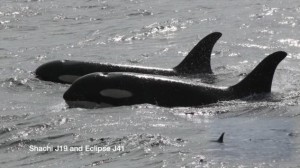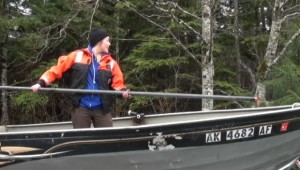 Comprehensive Conservation of Southern Resident Killer Whales in the Modern Ocean
Comprehensive Conservation of Southern Resident Killer Whales in the Modern Ocean
Southern Resident Killer Whales are endangered; only 85 remain. In today’s modern ocean they face many threats simultaneously. A holistic approach to addressing the cumulative impacts of all threats is needed. However, data are sparse, making it difficult to identify which threat(s) is causing the most harm. We are developing a new, comprehensive way to assess threats by having experts fill data gaps. With your help, we can pinpoint which protective actions will help Southern Residents recover.
 Whale snot and blubber: Tools used to better understand basic physiology in free ranging cetaceans
Whale snot and blubber: Tools used to better understand basic physiology in free ranging cetaceans
Baseline indices for steroid hormone levels in humpback whales do not exist, and current monitoring techniques are invasive. Hormones can advise in management, and help in understanding climate change related population shifts. We want to test if whale snot is reliable in collecting sufficient data without disturbing them. By analyzing hormone levels in both blubber and snot, we can establish hormone level baselines from blubber, and see whether less invasive snot-collecting is just as telling.
We haven’t featured Experiment yet in this Ocean Kickstarter series. Experiment is a crowdfunding platform exclusively for scientific research. It helps practicing scientists connect with a community funding base. Because of its narrow focus, Experiment is a little bit different. There are no rewards, instead you get access to updates about the project as it progresses. There is an elevated focus on budget, and, because it’s more akin to a philanthropic donation, rather than an investment, there is often fund-matching from NGOs and larger foundations.
Since last month’s recommendation won’t launch for another 25 years, this month I’ve picked two excellent projects to support.
Onward to the Ocean Kickstarter criteria!
1. Is it sound, reasonable, and informed by science? These projects are both pure science, with a solid conservation angle to them.
2. Is there a clear goal, timeline, and budget; and are they partnering with the people who have experience hitting those marks? Both projects have clearly outlined budgets and a track-record of successful scientific research. They have all the right connections and teams in place to get the job done.
3. Do some of the parties involved have a successful record with other crowdfunding projects and experience delivering on rewards? For an Experiment campaign, this factor is less important, since there are no rewards to deliver. Even so, at least one project leader, Peavey, has led successful past crowdfunding efforts.
Updates from past recommendations.
The Ocean Collection – Recycled Fishing Net Sunglasses raised $180,000, fulfilled rewards in late November 2015.
OpenROV Trident – An Underwater Drone for Everyone crushed Kickstarter, bringing in over $800,000, 1600% of their goal. Tridents ships November 2016.
Sharks4Kids First Book: Meet Norman the Nurse Shark raised over $16,000. Well done!
The Seabin Project: Cleaning the oceans one marina at a time had a rocky start, but they cruised in to an epic final week, raising $267,000.
Help Fund the Canton Water Wheel is still going strong and looking for support.
If you have an ocean crowdfunding project to promote, please read this: How to pitch an Ocean Kickstarter for us to review